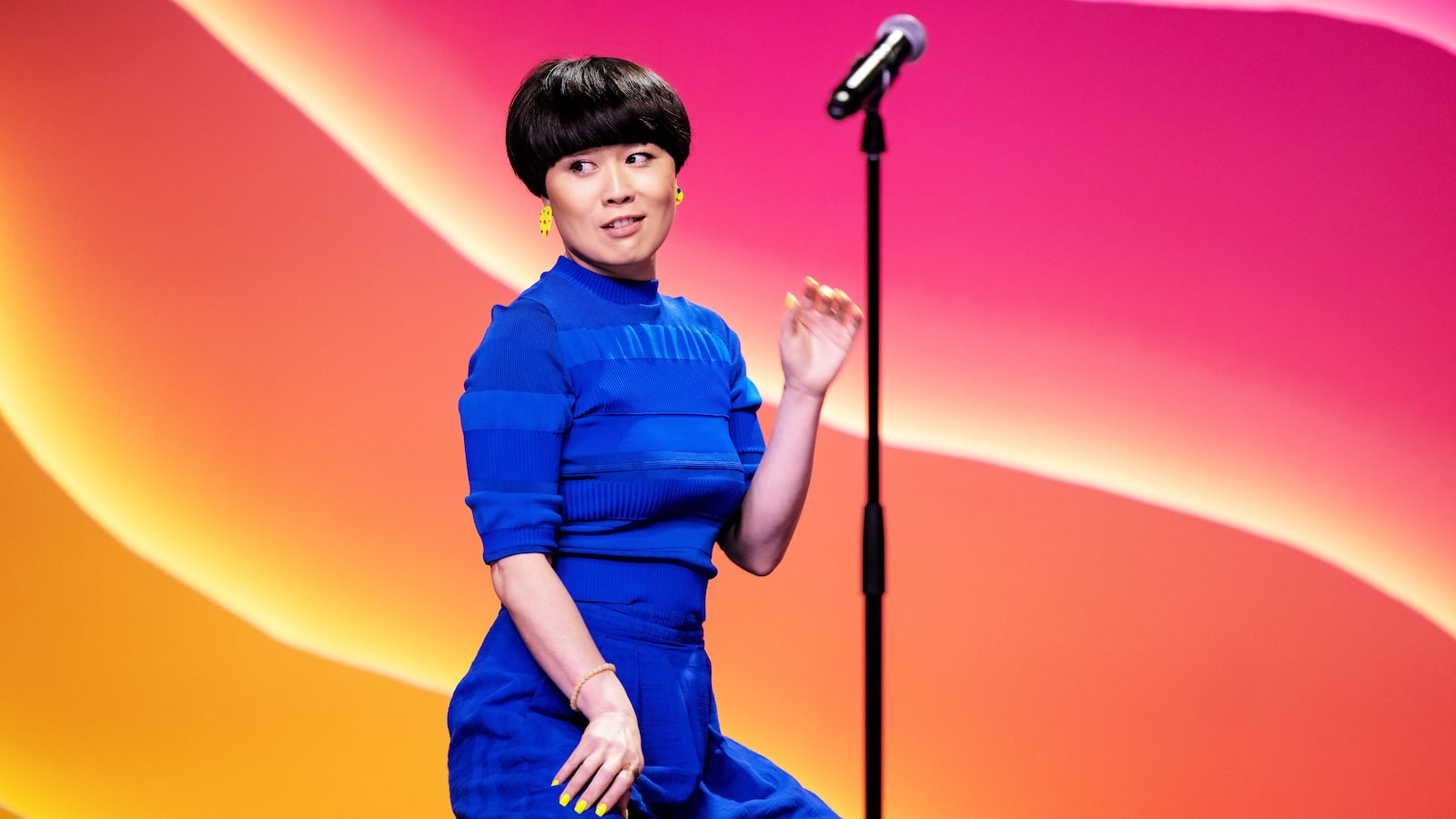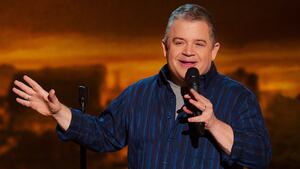Comedian Atsuko Okatsuka can’t seem to stop blowing up on the internet. Sometimes it’s by accident, like when she joked through an earthquake on stage, and other times it’s more deliberate, like the Beyoncé-inspired #dropchallenge she started on TikTok with her grandmother earlier this year. Now, those fleeting moments of online attention have culminated in her explosive new HBO stand-up special, The Intruder.
In this episode of The Last Laugh podcast, Okatsuka opens up about her often difficult journey from Taiwan to Japan to Los Angeles all before the age of 10, how she has managed to turn those challenges into her own unique brand of joy-filled comedy, and how her grandma really feels about her own viral fame.
There was a time when Okatsuka would open her stand-up sets by addressing the “elephant in the room”: her name. She would joke that the audience could just call her “Stacey” like her elementary school teacher did when she first moved to America.
“Whoever was bringing me up would always get scared at my name and say something weird,” she says. But now that she has her own HBO special and legions of followers on TikTok and Instagram, people are finally starting to get it right. Recently, she met a fan, also named Atsuko, who credited the comedian’s rising recognition for even the barista at Starbucks getting her name right.
As she was starting to put together The Intruder for HBO, Okatsuka recruited her “friend and idol” Tig Notaro to direct. The two comedians first met during the filming of a The Voice-esque Netflix reality competition show that was ultimately scrapped due to the COVID-19 pandemic. Notaro recently explained that she chose to “mentor” Okatsuka on that show because “not only was she SO funny but also SO different and SO ridiculous and SO clearly had such a great story to tell,” adding, “I loved her instantly.”
“She’s unapologetically herself, and I think that’s what I love so much about her,” Okatsuka says of Notaro, reciprocating the praise. “She reminded me that that’s why I’m here, too. Because I’m unapologetically myself.”
Born in Taiwan before spending her early childhood in Japan, Okatsuka immigrated to the United States with her mother and grandmother in the late ’90s. The three generations of women lived undocumented—essentially “in hiding,” as she puts it—in her uncle’s Los Angeles garage for seven years. By the time Okatsuka emerged into the world as a comedian, her mother had been diagnosed with schizophrenia.
It feels like some kind of miracle that she manages to find humor within her traumatic upbringing in this debut hour. “There’s fear for sure in the excitement, too,” she says of revealing so much about herself in the new special. “I hope people relate and like it and see themselves in it. Because ultimately that’s why I started doing comedy.”
Below is an edited excerpt from our conversation. You can listen to the whole thing by subscribing to The Last Laugh on Apple Podcasts, Spotify, Google, Stitcher, Amazon Music, or wherever you get your podcasts, and be the first to hear new episodes when they are released every Tuesday.
I wanted to ask about your earthquake clip that went viral, because that’s an example of something that you could never have planned.
Yeah, it was 2019. I was on stage at the Ice House Comedy Club in Pasadena and I was dancing up on stage because I get excited to be on stage, and as I was dancing, that’s when the earthquake hit. But I didn’t know, because everyone was screaming and I thought they were screaming for my dancing. And I was like, “Who, me? Oh, stop it!” And then I realized they were screams of terror. And people were like, “It’s an earthquake, it’s an earthquake!” I think it was a 7.1 magnitude. So immediately I went into jokes about it, but also wanted to make sure everyone was OK. So I did at first say, “Oh shit, I thought I was making that happen with my dancing” and got laughs. But then I made sure to stop everything and make sure everyone was OK.
It was very impressive that you were able to joke through it.
Truly, that’s what we train for as comedians. I have a mom with schizophrenia, I lived in a garage in hiding for seven years, I was undocumented for seven years, I haven’t seen my dad in forever. My dad’s on his third marriage. I just lost my stepmom. I have half-siblings that don’t talk to me because my mom was abusive to them. I mean, at a certain point it’s like, what’s an earthquake? Are you kidding me? When you do stand-up, which I do multiple times a week, every night, and we have to deal with drunk hecklers—Mother Nature? I got it, no problem.
Did the experience of watching that clip make the rounds and get attention give you a taste of what it’s like to have that viral fame experience and make you want to find other ways to do it?
No, that wasn’t the takeaway. I thought it was wild. I was like, “Oh, wow, you do comedy for so long—and my comedy is not bad, pretty good actually—but apparently during an earthquake it’s out of this world!” So it is funny that that is what it sometimes takes for people to notice you. But I love chaos like that. Sometimes it takes a #dropchallenge, which I also started earlier this year by accident. I’m always going, how do I connect to people? How do I make it so that it’s fun for the masses? But I’m never going, how do I make this viral? Because I don’t know how anything really goes viral. It has to hit people at the right time, I guess. And so I’ve had viral moments, like the earthquake or the #dropchallenge, other videos I made with grandma during the pandemic, things like that. But they’re always funny to me, because I’m like, “What? This? OK!”
So did you feel that way with the #dropchallenge? What was the story behind starting that?
Me and my grandma were just shopping in Little Tokyo in Los Angeles and I love that song by Beyoncé, “Partition.” It had been out for years, but ever since it dropped I was like, that bass drop is so cool. And me and grandma always like to make videos, anyway, just for fun. And so we were just having fun and I was like, wouldn’t it be fun if we’re walking around a Little Tokyo, and in my head I’m singing that song? I was like, what if I just sometimes “drop”—whatever we’re doing, while we’re walking, while we’re picking up groceries, while my grandma’s just standing there, I just drop in front of her to the beat? All of our videos take like 30 seconds to shoot.
Is it ever frustrating that the thing that gets the biggest reaction is the thing that took 30 seconds and the thing that you work on for years and years, maybe it doesn’t get as popular?
It could be, but I actually find it really refreshing because I love raw energy. And preparing, of course. I practice stand-up. I write, write, write and I practice at home to my plants. They die. And I bring it to the stage. I’m such a nerd about stand-up comedy and writing jokes and that part is really important to me. But there’s nothing like raw energy and being down for that when you’re on stage too. And so yeah, it’s actually freeing that people like seeing the DIY-ness of something, the maybe not-so-professional aspect of it. Isn’t that why people like SNL too? Because something could go wrong.
What does your grandmother think about all of this? She’s been starring in your videos in different ways for a while now.
She’s understanding. She’s picking up on it because, you know, anything Hollywood, industry, entertainment, it’s so far removed from anything our family has ever been a part of. And so for grandma, she had a lot of questions. What do these views mean? Why don’t they equal money?
Why doesn’t it pay? That’s a good question! I’m entertaining people for free when I post things on social media. And then it all kind of came together for her when she came out with me to shoot my HBO special in New York, because then she saw the crew and the director and the people that came out for me and all these people working to make my special happen. And we flew in first class, and we’d never done that before. From the garage to first class! And she was like, “The champagne is free? And the meal is free? My seat reclines? I can lay flat on a plane?” And I think she was really understanding then, too, that this whole thing is a racket. [Laughs] No, not a racket. But it’s like, you can really just write jokes and get there.
I mean, your comedy was good enough to get you this special no matter what, but do you think that the videos and all that attention that you got for that stuff did play a role in making the special happen and getting to where you are?
All of it. Everything you do plays a role in where you are today. Every single thing. I’m an open book and I’m so thankful, because it is scary to be an open book. This is me. I like this song. I like dancing like this. This is my grandma. I like dancing with her. We have fun because she was always a caretaker and she didn’t always get to play, and now she gets to. This is my mom. She has schizophrenia. I love her. This is my husband. This is who I am. These are my fears. These are my weird quirks. I don’t speak English correctly—still! This is me. This is my haircut. This is my actual haircut as a grown woman, a bowl cut, yes, this is me. It’s all scary, but that’s how the fan base grew and that’s how people came out to see my comedy.
You do find ways to make even something like your mother’s schizophrenia funny in the special, which can’t be easy. How did you go about trying to find comedy in that?
It took a lot of time. And it honestly took the pandemic. Because everyone was looking inwards more and thinking more and self-reflecting more. And I was doing the same. It’s not just a pandemic. People are going through depression, bipolar, other mental illnesses like my mom. And now they’re isolated and maybe they can’t see their loved ones… elders. [Starts to cry] Sorry, I got really sad just now. My mom and grandma live 20 minutes away from me. But there were so many people who didn’t get to say goodbye to their grandma, because she passed and they couldn’t be near her. And so that all made me really want to make things better for everyone even more. My mom’s not the only one suffering from this. My husband’s mom also has schizophrenia and I can at least speak from my experience and make people laugh about it. And not just laugh about it, but also normalize it.
For anyone who watches your special and is going through something similar, I think it really does help to hear someone talking about it in that way and finding lightness and joy in something that can be so difficult.
Totally. That would make me so happy.
Listen to the episode now and subscribe to The Last Laugh on Apple Podcasts, Spotify, Google, Stitcher, Amazon Music, or wherever you get your podcasts, and be the first to hear new episodes when they are released every Tuesday.


